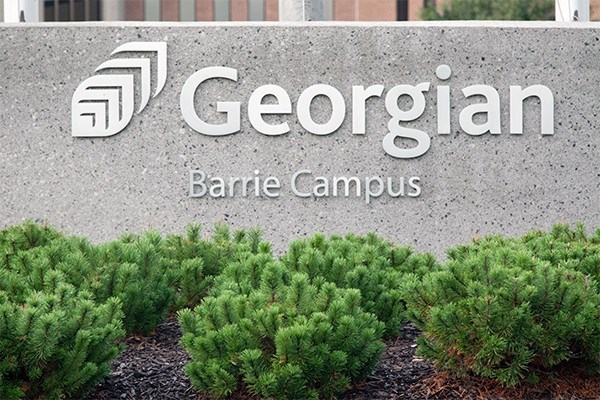As Georgian College gets set to start a new semester online, it continues to deal with the repercussions of the pandemic, including a $43-million shortfall.
“We were fortunate in March, we took a week to reposition ourselves,” said Georgian College president MaryLynn West-Moynes. “We just felt we had to fulfill that promise. Students were in mid-semester. Other students had moved here for the summer semester. And I’m really proud of how Geogian’s faculty and staff have been innovative and creative.”
The online protocol that was developed allowed students to finish that semester and set the foundation for ongoing online learning with 4,000 students studying remotely for the summer. Although West-Moynes pointed out that’s down about 1,500 students.
Currently, students from the past two semesters are completing the hands-on components of their programs, following industry standard pandemic protocols.
On Sept. 14, the fall semester begins with 70 per cent of Georgian students having the ability to do their entire programs remotely. The other 30 per cent will participate in labs and practicum.
“Some businesses and restaurants have had to close… we’ve been fortunate in that we’ve been able to continue on,” said West-Moynes. “Our faculty totally understands that learning isn’t only about a classroom, it’s about the engagement.”
But there have been repercussions as a result of the pandemic.
Normally Georgian has about 13,000 students over the course of the year but currently the numbers are tracking at about 11,000, representing a 15 per cent decrease.
This fall, registration of domestic students is expected to be down about four per cent, slightly better than the average for Ontario colleges, and international registration is down about 24 per cent.
The drop in registration and ancillary fees has resulted in a $43-million loss in revenue of a $300-million annual budget.
Government funding represents about 25 per cent of the budget.
But enrollment numbers are fluid and just how they end up for the winter semester remains to be seen.
“That will depend considerably on how the world manages on the introduction of the flu season and cold weather,” said West-Moynes. “Everybody’s wondering about that next phase and how that impacts society.
“There are some challenges but all of this pales to the challenge of so many people who have been ill or in fact lost their lives and loved ones who have been left without someone in their family as a result of this horrible disease,” she said.
As for the shortfall, there have been cutbacks but all full-time and unionized staff have been maintained. Not all contracts, however, have been renewed and some people have had their hours cut.
In addition travel and other expenses have been cut, she added.
Colleges have not been eligible for federal pandemic funding. But colleges continue to lobby the provincial government for additional support.
“If we’re not out of this by next March… we will lose another significant portion of international students,” she said. “So the future is worrisome if the world doesn’t deal with the COVID issue.”
Typically, international students make up about 40 per cent of the student body at Georgian, which West-Moynes said is consistent with the province’s college and university system.
The college is expecting about 500 new international students this year, many beginning their studies remotely.
The majority of the college’s international students who were studying at Georgian stayed in Canada through the pandemic, West-Moynes added. The federal government is also allowing some students into the country.
Georgian has arranged to pick up international students as they get off the plane and take them directly to their residences where they will remain in quarantine for two weeks, having meals brought to them with additional supports in place.
“It really has been awesome, absolutely awesome how both our faculty/support staff and our students have adjusted to this new mode,” she said.
College staff, who are able, also continue to work from home to reduce the number of people on campus. Students are expecting to do the entire semester remotely.
Anyone coming onto the campus has to complete a COVID-19 questionnaire daily, pass through controlled entrances, wear masks and maintain distancing. West-Moynes said deep cleaning takes place daily, twice daily in labs and places where faculty and students use equipment.
Areas dedicated to health-related programs follow protocols established by their professions.
West-Moynes said the college has been planning through the pandemic in four-month chunks.
“It’s never really been what we knew about COVID that was the challenge to manage, it’s what we didn’t know about COVID was the challenge to manage,” she said, pointing to how it spreads and preventing that.
“It has been a challenge but I’m grateful that we’re in the situation we are in. I recognize that there’s other businesses in the community that are far worse off than we are,” she said.
In addition, the provincial government contributed an additional $1 million in the spring which Georgian opted to use to provide bursaries to students who suffered financial impacts as a result of the pandemic.
The Ontario college system has requested funding for technology and technology-enabled learning which West-Moynes said would not only help students through current challenges but will also provide them with future opportunities.
She points to simulation programs available to students in programs like engineering and marine navigation as examples of how colleges can expand upon the use of digital technology.
“I think that’s the future of where we’re going,” she said.
There is also a request to the government for the ongoing additional cleaning and to maintain distancing protocols.
The current citation, said West-Moynes, is exposing students to change management and resilience as well as digital experience, providing them with added skills to enter into the workplace.



